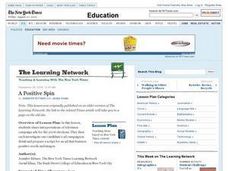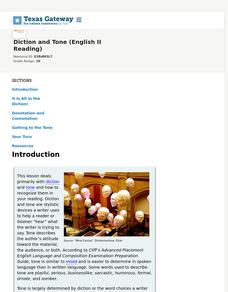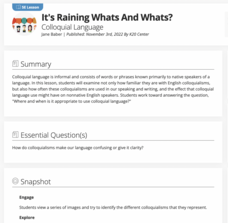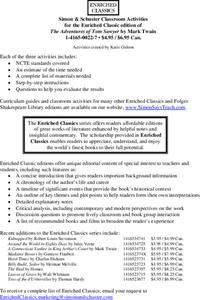Penguin Books
A Teacher's Guide to the Signet Classics Edition of H.G. Wells's The Time Machine
Imagine being able to travel back and forth in time! H.G. Wells uses that scenario in his novel The Time Machine to comment on what he saw as the flaws in Victorian society and the industrial age. This teacher's guide is one of...
Curated OER
A Positive Spin
Study word choice and connotation in advertising. Readers examine campaign ads, both negative and positive, from the 2006 mid-term election before discussing an article and analyze a campaign of any candidate they choose. Finally,...
Media Smarts
Bias in News Sources
As young consumers of media, it is important for high schoolers to explore concepts of bias and prejudice, and how they may be present in media. After discussing ideological messages that media can contain, individuals complete a warm-up...
Texas Education Agency (TEA)
Drawing Conclusions Based on the Sufficiency and Strength of Research (English III Reading)
High school juniors learn how to construct a strong argument by crafting a claim and using neutral language backed by evidence from reliable sources. To do so, they learn to evaluate sources and evidence to support claims. They then...
Texas Education Agency (TEA)
Reference Guides (English III Reading)
An interactive resource introduces users to dictionaries, glossaries, and thesauri and the significant differences among these reference guides. Users learn which reference is best for which kind of search, examine sample entries from...
Texas Education Agency (TEA)
Cognates (English III Reading)
Did you know that "30-40 percent of all words in English have a related word in Spanish?" This fact launches an interactive study of cognates appearing the same in English and Spanish. Learners demonstrate what they have learned about...
Texas Education Agency (TEA)
Diction and Tone (English II Reading)
Words carry baggage. In addition to their literal, denotative meaning, words also carry the weight of the associations and connotations attached to the word—the connotations of words writers use to create the tone of a piece. An...
Anti-Defamation League
Intent vs. Impact: Why Does it Matter?
Contrary to the popular saying, words can hurt. Words matter! Tweens and teens can reflect on how words impact others even if the intent wasn't how the words were perceived. After examining an Instagram post where Lizzo apologized for...
K20 LEARN
Things Are Lit at Thornfield: Jane Eyre
Jane Eyre offers scholars an opportunity to practice reading comprehension skills. Pairs are assigned a word from the text, use their prior knowledge, and consider the context, connotation, and denotation of the word to posit a...
K20 LEARN
It’s Raining Whats and Whats? Colloquial Language
"Yuns betta outten the lights!" Colloquial language is the focus of a lesson plan that asks middle schoolers to consider the pros and cons of using idioms. They read articles, match expressions with their meaning and place of origin, and...
K20 LEARN
Is Pizza Epic? Word Choice
Remember when everything was Fantastic! Fabulous! Awesome! Iconic! A series of activities encourages young writers to move beyond these overused descriptors and instead choose a more precise language.
K20 LEARN
That Which We Call a Rose: Connotation and Denotation in Romeo and Juliet
Words carry weight. And some words carry baggage. Scholars learn the difference in a study of connotation and denotation. Individuals sort the cards into three groupings using words from Shakespeare's play. After sharing within groups,...
Curated OER
An Ideal for Which I Am Prepared to Die
English language learners have an opportunity to closely examine the academic language in portions of Nelson Mandela's famous 1964 Court Speech, "An Ideal for Which I Am Prepared to Die," with a lesson that looks at key passages from the...
Core Knowledge Foundation
Unit 7: Anne Frank’s Tales from the Secret Annex Teacher Guide
Frequently banned, often challenged, a mainstay of middle school curriculum, Tales from the Secret Annex, is the featured text in the seventh unit in the Teacher Guide Core Knowledge Program. The 134-page guide includes an...
Overcoming Obstacles
Listening Critically
Eschew obfuscation!! High schoolers learn techniques that permit them to listen critically, sort through verbiage used to hide meaning or mislead listeners, and determine the message's validity.
Trinity University
Dante's Inferno: Allegory, Hero's Journey, or Epic Poem? Yes!
Dante Alighieri's "The Inferno" is the central text in a unit designed for high school seniors. Scholars compare the Christian concept of Hell to Dante's. In addition, they examine the tale as an example of epic poetry, as an allegory,...
National Endowment for the Humanities
Dostoevsky's Crime and Punishment
Pain and suffering do not have to be inevitable in a study of Crime and Punishment. A carefully scaffolded lesson introduces readers to the divided natures of the characters in Fyodor Dostoevsky's complex novel. Groups use the...
Franklin D. Roosevelt Presidential Library & Museum
Pearl Harbor Activity #2: Why Do Words Matter?
Words matter! That's the big idea behind an activity that asks scholars to replace words in FDR's "Day of Infamy" speech with synonyms. They then listen to a recording of President Roosevelt's address and compare his version to their own.
Newseum
Disinformation Nation: Separating Politics and Propaganda
Separating political rhetoric from propaganda is no small feat. Class members are challenged to examine two different sources about a candidate in an upcoming election and determine whether the primary purpose of the source is to inform...
Newseum
Disinformation Nation: Is It Propaganda?
Propaganda or not? That is the question researchers must answer as they analyze techniques used in ads. Pupils use a three-part definition to determine if the ad is propaganda or advertising.
Newseum
Disinformation Nation: Checking Your Emotions
Propaganda is designed to manipulate! High schoolers learn how to recognize the devices propagandists use to evoke strong emotional reactions and practice techniques that help them avoid being manipulated.
Simon & Schuster
Classroom Activities for The Adventures of Tom Sawyer by Mark Twain
A 16-page packet includes three activities for a unit study of Mark Twain's The Adventures of Tom Sawyer. Before beginning the novel, class members identify the factors in their lives that helped create their frame of reference,...
Newseum
Weed Out Propaganda
Young scholars study four essential propaganda techniques: Simplification, Exploitation, Exaggeration, and Division (S.E.E.D.). Individuals select an example of propaganda from the past and present then compare how the key elements have...
Simon & Schuster
Classroom Activities for The Call of the Wild by Jack London
Three activities are designed for readers of Jack London's The Call of the Wild. First, class members research and create posters that reflect the setting of the novel. Next, groups create posters with images that represent each chapter...

























